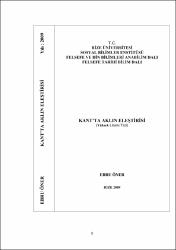| dc.contributor.author | Öner, Ebru | |
| dc.date.accessioned | 2019-11-04T11:14:02Z | |
| dc.date.available | 2019-11-04T11:14:02Z | |
| dc.date.issued | 2009 | |
| dc.identifier.uri | https://hdl.handle.net/11436/715 | |
| dc.description.abstract | Bu çalışmanın amacı; Immanuel Kant'ta aklın ne olduğu ve aklın neyi bilip neyi bilemeyeceğini eleştiri yoluyla belirlemek, böylece aklın sınırlarını ortaya koymak ve metafiziğin imkânını araştırmaktır. Araştırmamız üç ana bölümden oluşmaktadır.Birinci bölümde İlk Çağ'dan Kant'a kadar ?akıl nedir?? sorusunu cevaplamaya çalıştık. Bunu yaparken Kant'ın eleştiri felsefesinin temeli olan rasyonalist (akılcı) ve empirist (deneyci) filozofların akıl hakkındaki görüşlerini ele aldık.İkinci bölümde Kant'ta salt aklın ne olduğunu sistematik olarak ortaya koyarak, aklın nasıl eleştirildiğini irdeledik. Kant için salt akıl, ne rasyonalist filozoflarda olduğu gibi salt bir bilgi kaynağı, ne de empirist filozoflarda olduğu gibi boş bir levha'dır. Kant'ta bilginin oluşabilmesi için hem akıl hem de deney gereklidir. Bu görüşüyle Kant, rasyonalizm ve empirizmin bir sentezi olan kritisizm (eleştiri felsefesi) akımını kurmuştur.Üçüncü bölümde Kant'ta pratik aklın eleştirisini ele aldık. Sonuç olarak Kant'a göre, ?teorik akıl? için mümkün fakat problematik olan Tanrı, ruh ve özgürlük konularını içeren metafizik alanın, ?pratik akıl? için zorunlu bir varlık alanı olduğunu ortaya koymaya çalıştık. The purpose of this study is to determine what the reason is and what the reason can know or can not know in Immanuel Kant by the way of criticism, by this way put forward to the boundaries of reason and to search the possibility of metaphysics. Our study consist of three main part:In the first part; we tried to answer the question what the reason is from first age to Kant. While doing this we took charge of the opinions of rationalists and empirists who are the basis of critisizm of Kant about reason.In the second part; we investigated how the reason was criticized by puting forward what the pure reason is systematically. For Kant the pure reason is neither the only source of knowledge as for rasyonalists, nor a tabula rasa as for empirists. In Kant in order for knowledge to be formed both reason and experiment is need. With his this opinion Kant founded Kriticism which is a synthes of rationalism and empirism.In the third part; we took the charge of the criticism of practical reason for Kant. Consequently we tried to prove that the metaphysics which contains the subjects as freedom, soul and God which is possible for teorical reason but problematic, according to Kant is a compulsory existence area for practical reason. | en_US |
| dc.language.iso | tur | en_US |
| dc.publisher | Rize Üniversitesi / Sosyal Bilimler Enstitüsü / Felsefe Bölümü / Felsefe ve Din Bilimleri Anabilim Dalı / Felsefe Tarihi Bilim Dalı | en_US |
| dc.rights | info:eu-repo/semantics/openAccess | en_US |
| dc.subject | Felsefe | en_US |
| dc.subject | Philosophy | en_US |
| dc.title | Kant'ta aklın eleştirisi | en_US |
| dc.title.alternative | Criticism of reason in Kant | en_US |
| dc.type | masterThesis | en_US |
| dc.contributor.department | 0-Belirlenecek | en_US |
| dc.contributor.institutionauthor | Öner, Ebru | |
| dc.relation.publicationcategory | Tez | en_US |


















